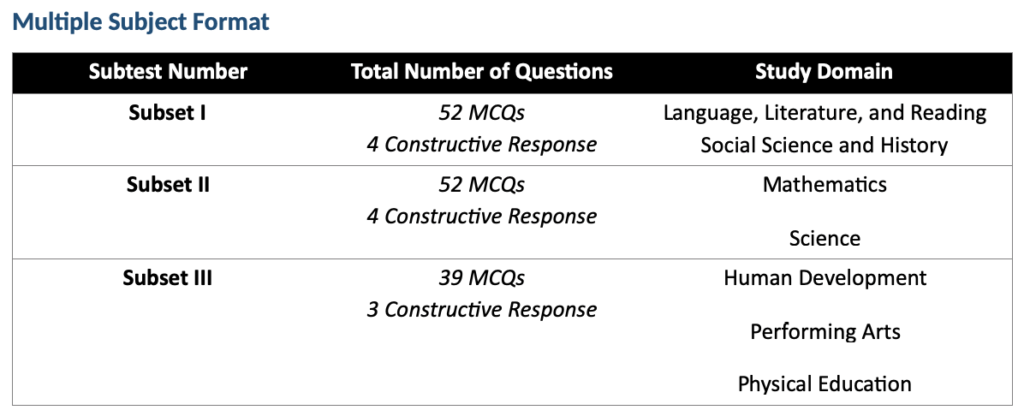About The CSET
CSET or California Subject Examinations for Teachers is a series of exams set forth by the SBEC or State Board for Educator Certification. ETS or Educational Testing Service serves as the chief administrator.

CSET or California Subject Examinations for Teachers is a series of exams set forth by the SBEC or State Board for Educator Certification. ETS or Educational Testing Service serves as the chief administrator.

The design of the test establishes the criteria of whether or not an applicant has sufficient skills and knowledge relevant to become an educator at entry-level in the public-school system of California.
The series of exams evaluate an individual’s specific and general teaching capabilities. In fact, the subject areas that CSET test covers have become a standard requirement to receive the status as a certified educator in California.
Teachers played a crucial role when it comes to CSET’s design, development, and structure. Each topic in the exam is related to a specific subject area. Continue to read to find out the complete format, requirements, content of subsets, due dates, eligibility, and registration details:
Purpose of the Test
As per California’s Education Code, teachers have to showcase their expertise in the subject matter they want to teach. Therefore, it makes sense that the CSET test is one of the best methods to review this requirement in detail.
In essence, the underlying purpose of the CSET is to measure the knowledge and skills of an aspiring teacher without biased or prejudiced judgment. When it comes to the CSET test, you will find a few exceptions in the FAQ section of this article.
Since the nature of the test is related to academia, the extensive and broad range of subject areas shouldn’t come as a surprise to the test-takers. The subject matter ranges from educational topics to career-specific knowledge.
Generally, the CSET test includes subject topics like music, dance, general science, social studies, English, arts, history, journalism, health, mathematics, physical science, and many other topics. Similarly, certain portions of the test cover subject areas for individuals who want to teach at specific grade levels.
The CSET exams’ objective is to make sure the applicants are knowledgeable enough to start a professional position in the education system. You can say that the CSET test improves your future prospective in academic positions such as a reading specialist, superintendent, school counselor, or principal.
What Type of Job You Can Get After Passing CSET
Academic education presents a wide variety of rewards for teaching candidates. In fact, individuals often fail to comprehend the realistic aspects of career opportunities in the field they want to teach. Although the process to prepare and pass the CSET takes does take time, it is still the primary criterion for states to take candidates seriously for high-level academic positions.
There are numerous perks so long as you have a teaching certification from a reputable university, practical experience of teaching or assisting, and pass your state’s fundamental skills exam. Getting a teaching license is a step-by-step process and doesn’t happen overnight. However, with proper preparation and goal-setting, you can obtain your teaching license this year.
CSET: Is It Too Difficult?
Several aspiring teachers shudder at the thought of studying more than a dozen subject areas. Although the extensive nature of the CSET may come across overwhelming to a lot of individuals, it is vital to remember that you intend to pass an academic-based test. Therefore, the level of difficulty doesn’t matter when you want to pursue your career in educational fields.
The good news, however, is that the CSET comes in random order. It means unlike other tests where challenging sections deserve more focus, you have to prepare equally for the entirety of the test. Furthermore, the timing strategies and pacing depend on your overall strengths and weaknesses.
Don’t Confuse CSET with CBEST
You’d be surprised how many individuals confuse CSET with CBEST. And that’s fair because the CTC designed both exams for the state of California’s potentially skilled teachers. That said, both tests share fewer similarities and more differences from each other.
Technically, CSET is a group of exams where each subject matter of the exam may be the area of expertise a teacher wants to teach. The typical examples would be the field of mathematics, foreign languages, or agriculture. Furthermore, the passing score represents your competence in a specific subject matter to qualify for a teaching license.
The CBEST test, on the other hand, is composed of one standardized test that assesses test-takers’ skills in three key areas such as reading, writing, and mathematics. Also, it is significantly shorter and less complicated as compared to the CSET test. CBEST, however, serves a vital purpose in which candidates can demonstrate and live up to the necessary academic requirements to become a teacher.
CSET Passing Criteria
Individuals who want to pass the CSET will have to get a score of 220 or higher on each mandatory subtest that you want to specialize through the exam. However, to make the format easier, each subtest has a score scale of 100-300. The scale score is practically the conversion of your raw scores. Nonetheless, remember that the minimum score to pass in the CSET is (more or less) similar in all subsets.
CSET Test Format
The administration uses proportions to score the majority of the CSET exam’s subsets. Multiple-choice-based questions amount to 70%, whereas constructive responsive-based questions amount to 30% of the CSET exam.
The entire CSET exam with a variety of subject areas revolves around three essential subset categories. Each subset concentrates on specific topics taught throughout the K-12 grades. The CSET exam’s administration offers certification individually when it comes to preliminary education, academic writing, technology, and other single subjects.





CSET Score Criteria
CSET is inherently a combination of referenced-based exams. In fact, it all comes down to your scale grade. Also, other student’s good or bad performance does not have any impact on your individual scores. Well, you have to get a minimum of 220 score on every subset to pass.
CTC states that the collective passing rate for more than a decade has been almost 70%. However, the individual passing rate ranges from 79% to 96%. Remember, you won’t get your full results until two weeks after the test. Also, the release date for scores can vary from one exam to another.
It means the candidate wants to take General Science subsets will receive his or her results on a different date than, say, Social Science candidate. You can, however, check the data you may receive your results once you select a suitable date for the test.
Your score criteria, however, revolves around the combination of multiple choice-based questions and constructive responses. Therefore, don’t presume that all items on a specific subset are equal. However, the score scale for all subsets ranges from 100 to 300.
Eligibility Requirements and Options
You can qualify to attempt CSET so long as you have a GED or any other equivalent. You can also take the test if you have a high school diploma or are currently enrolled in a college program. The availability of CSET comes in a wide range of options.
Cost-Structure
Each subset of the CSET exam comes with a different price tag. You will need $99 to register for each subtest separately. Collectively, it costs $247 to register for all the subtests of the subject areas. However, some subsets might go over $100 in a few subject areas. Remember, you don’t have to pay anything if you decide to change your initial exam registration. However, you will have to pay a $50 fee to get the verification of your score.
GED® is a trademark of the American Council on Education® which is not affiliated with this website. HiSET®is a registered trademark of Educational Testing Service (ETS). Our product is not endorsed by ETS. PTCB® and PTCE® are trademarks of Pharmacy Technician Certification Board. HESI is a registered trademark of the Health Education Systems Inc., which was not involved in the production of our product. TEAS® and Test of Essential Academic Skills™ are registered trademarks of Assessment Technologies Institute, which is unaffiliated, not a sponsor, or associated with this site. MBLEx is a trademark of the Federation of State Massage Therapy Boards (FSMTB) that did not produce our material. ACCUPLACER and CLEP are registered trademarks of the College Board, which was not involved in the production of our product. All trademarks are property of their respective trademark owners. 2025 — UGO Prep — Sitemap
